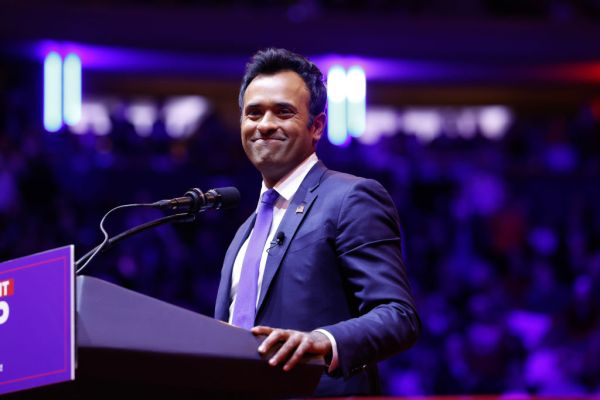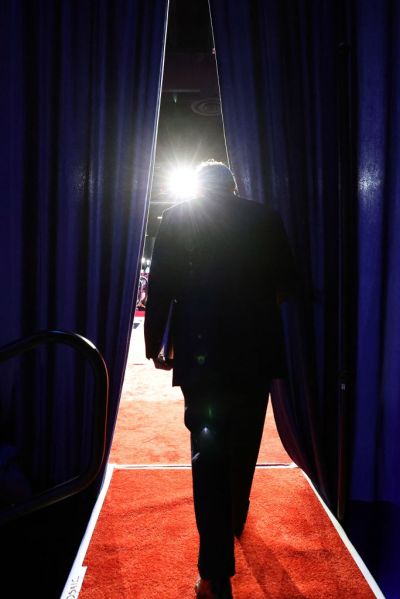Yesterday a friend messaged me to say that one passage from Monday’s newsletter had rung his bell. It had to do with motives. Perhaps some conservatives who’ve moved away from right-wing policies during the Trump era have done so, I wrote, because they’ve begun to doubt the good intentions of leaders who support those policies.
If the average Republican says the law should be harder on drug dealers, you and I might eagerly agree. If an aspiring strongman in the mold of Rodrigo Duterte says the same thing, you and I might worry instead about how a more draconian legal regime would eventually be abused.
Authoritarianism brings out the libertarian in decent people.
In less decent people, the line between libertarianism and authoritarianism can be thinner than one might think.
Consider Stewart Rhodes.
Rhodes began his political journey as a libertarian so staunch that it landed him a job in Ron Paul’s office after college. In 2009 he founded the Oath Keepers, whose name comes from the pledge members take not to follow orders that violate the U.S. Constitution. Within a few years he was calling for arming and training civilians to resist a violent power grab by the federal government.
In his email announcing the launch of the plan, Rhodes lays out the course of action he predicts “the enemy”—the government—is preparing to follow, including “intentionally triggering a catastrophic economic collapse” as a means of creating disorder that they will then use as an excuse to impose martial law, destroy the constitution and use the billions of dollars in ammunition, armored vehicles and weapons he claims the Department of Homeland Security and local police have been stockpiling “to control and contain us.”
There are libertarians, there are strong libertarians, and then there are dudes who start their own militias. That’s Stewart Rhodes.
He’s an extreme case even by the standards of extremes. But in one sense his beliefs were and are mainstream: Rhodes viewed an armed populace as a bulwark against government tyranny. So did the Founding Fathers, per the Second Amendment. So do most conservatives. If you support gun rights, as I do, one likely reason is because you want a way to protect yourself juuuust in case things ever take a turn in Washington, D.C.
As fate would have it, things did—almost—take a turn in Washington, D.C., in early 2021.
Which side was Stewart Rhodes, staunch libertarian, on when they did?
If you’ve seen the news lately, you know. When the hour at last arrived that a federal government led by a strongman sought to overturn the will of the American people, Rhodes supported the strongman. Not only did he support him, he egged him on. In December 2020, a month after Joe Biden won the presidency, Rhodes encouraged Donald Trump to invoke the Insurrection Act and call up the National Guard to suppress the alleged “coup” that was poised to drive him from office.
Invoking the Insurrection Act is exactly the sort of tyrannical power play militia members fear might be used by an oppressive regime to justify a violent crackdown. Yet here was Stewart Rhodes, head of the Oath Keepers, demanding that it be used against his fellow citizens.
Behind the scenes, he was doing more than making demands. He was arming up, hoping and expecting that his organization would be part of the coming crackdown.
He went far enough to earn himself a conviction for seditious conspiracy, an unheard-of offense in modern America. It’s gratifying to see him punished for his actions, yet the charge doesn’t sit right with me. He didn’t want to overthrow the sitting government, after all. He wanted to keep it in power. Stewart Rhodes, staunch libertarian, volunteered to be lead henchman in an attempted autogolpe.
One might call that an example of the so-called “horseshoe theory” at work, but that’s also not quite right. The horseshoe theory holds that politics is less a linear spectrum, with far right and far left at opposite poles, than a horseshoe in which the extremes lie close to each other. The further you get toward the ends of the horseshoe on either side, the more collectivist the politics become.
I don’t think Rhodes is a collectivist. I think he’s an activist whose alleged principles extend no further than his own interests. He doesn’t care about constitutional rights, he cares about his constitutional rights. When the federal government is controlled by the left, it’s an adversary that might threaten him. But when it’s controlled by the right, it’s an ally that might threaten someone else.
And why would Rhodes be concerned about that?
A man who had gone as far as to found his own militia out of supposed ardor for the Constitution abetted a strongman’s coup attempt because their politics aligned. All it took was a bare assertion without credible evidence that the election had been rigged against a right-wing president to flip Stewart Rhodes from freedom warrior to fascist goon.
I think of him often in the context of the post-liberal turn in American politics because his corruption, while unusually vivid, isn’t that unusual in substance. At the heart of it is the idea that “I got mine.” Under a classically liberal ethic, the same rules apply to both sides; if you support the First Amendment, say, then you support a liberal’s right to free speech just as you support a conservative’s. Under a post-liberal ethic, there’s barely a pretense that fair play should be the goal. When your side has the power to set the rules, you wield that power aggressively to benefit your own side.
You get yours.
That’s all Stewart Rhodes did in calling for Trump to invoke the Insurrection Act. He’s a post-liberal cretin decked out in the intellectual finery of a freedom-loving classical liberal.
He’s not alone.
A thought experiment. If Trump won a second term and announced a new military initiative to disarm left-wing “domestic terrorists” like Black Lives Matter or Antifa, how much opposition would that initiative meet from Republican voters?
As a matter of classical liberal principle, it’s an easy call. The president seizing weapons from his political enemies is a textbook worst-case scenario under the Second Amendment.
In our post-liberal “I got mine” reality, though, some of the loudest supporters of the Second Amendment in conservative politics and infotainment would inevitably support the initiative I’m hypothesizing. Marjorie Taylor Greene and Lauren Boebert believe in their own right to own a gun, as well as the rights of all red-state Americans to do so. But do they believe in an arbitrarily defined left-wing “terrorist’s” right? Knowing that defending that right would align them with those “terrorists” against Donald Trump?
Whose side do we think staunch libertarian Stewart Rhodes would take?
Many theories have been offered to explain why Trumpism took such tight hold of the Republican base, but an underrated one is how Trump made the right comfortable with “I got mine” as an ethos. You could hardly do better than those three words as a summary of his approach to life, frankly; look no further than how he used, or didn’t use, his Super PAC’s war chest this cycle for just one very recent example. His genius lies in packaging ruthless self-interest to his fans as not just rational but just. Whenever he’s caught doing something corrupt, for instance, he pivots to complaining that his enemies went unpunished for supposedly worse misdeeds. When he was challenged in the 2016 primaries for having donated to Democrats in the past, he conceded that America’s system of political patronage is foul but insisted he was only playing by the same corrupt rules as others.
Every Trump scandal becomes a story about the greater corruption of liberals who exploit a system that’s been designed to benefit them, the obvious implication being that only suckers on the right insist on continuing to operate within that system. You’ll never be able to say “I got mine” if you keep playing by unfair rules set by and for left-wing institutions. Justice requires you to bend or break those rules from time to time to advance your interests, like, say, by trying to get electoral votes thrown out on flimsy pretenses after you’ve lost a national election.
That’s an irony about Trump. He vacillates between immoral and amoral in his behavior but his appeal to right-wingers is essentially a moral one. He grants them moral license to behave ruthlessly toward their opponents by framing it as a matter of fairness. When you’re ruthless toward the left, you’re only balancing the lopsided scales of classical liberalism that favor them.
The endless whataboutism to which most Trump-era conservatives resort whenever our side is criticized comes directly out of that logic. Whatever the right may be guilty of, however corrupt it may have become and is yet becoming, fairness requires focusing instead on how the left’s greater corruption logically unbinds conservatives from classically liberal rules.
Sure, the president seizing guns owned by left-wingers is bad in the abstract. But what kind of conservative wants BLM “terrorists” to have guns?
Because Stewart Rhodes was especially ruthless in trying to balance the proverbial scales, I wouldn’t discount the possibility that he’ll be pardoned in a second Trump term.
There’s another prominent case of “I got mine” disguised as principle that’s been in the news, far less sinister than Rhodes and his insurrectionist cronies, yet far more visible.
How is Elon Musk’s project to save free speech by buying a second-tier social media platform going these days?
It sounds very high-minded.
It’s less high-minded in practice. A few days after Musk declared that “comedy is now legal on Twitter,” accounts parodying him began to be suspended. Other accounts operated by “antifascist researchers” have reportedly been designated “Antifa” and shut down on the recommendation of right-wing activists. A few days ago a wave of Chinese spam bots successfully flooded into the platform and buried tweets about the recent “zero COVID” protests in China. It’s unclear how that happened. Maybe Musk no longer has enough staff to deal with problems like spam—or child pornography—or maybe he has higher priorities at the moment.
There are also claims of unusual activity surrounding tweets about the protests.
Making the platform user-friendly for Chinese dissidents would be a dramatic, even heroic way for Musk to prove his commitment to free speech. But for all his soaring rhetoric condemning tyranny, Elon turns out to be a bit of a China simp. He thinks “China rocks” and has compared the work ethic there favorably to the increasing complacency and entitlement he perceives in the United States. Worse, when Tesla chose to open a new dealership in China earlier this year, it did so in Xinjiang province—ground zero of the Uyghur genocide. In an era when some businesses are moving out of Xinjiang to protest what’s happening, Musk is moving in.
With all of that as background, you may wonder what he and his fans mean when they complain about free speech. There’s no country on Earth that stifles the speech of more human beings than China does, and to all appearances he’s unbothered by that. So what’s bothering him? Whose speech is he thinking of?
Why, his own, of course.
Like many advertisers, Apple may be leery of promoting its products on a platform whose direction is unclear and looks to be growing darker. The insurrectionist-in-chief was recently allowed back onto Twitter. So were many other previously banned accounts as part of a general “amnesty” declared by Musk. Yesterday came word that COVID misinformation would no longer be policed on the site.
Musk is making Twitter safe for election deniers, edgelords, and anti-vaxxers bit by bit and Apple isn’t keen to invest in his vision, unsurprisingly. (A man as accustomed to being subsidized and as unaccustomed to advertising as Musk might not grasp the concept.) Some users pointed out to him that Apple has speech rights too and is exercising them by declining to participate in his new direction—assuming that’s even true. Shrewder critics, like my colleague David French, noted that Apple really is guilty of a terrible affront to free speech that has nothing to do with Musk. Recently it updated iPhones in China by disabling a file-sharing feature after 10 minutes, making it harder for protesters there to share information surreptitiously.
Watching the world’s most redpilled billionaire whine that Apple hates free speech because it won’t fund his vanity project, not because it’s sabotaging actual dissidents risking their necks for freedom, is an almost comically glaring example of “I got mine” logic. I don’t know where Musk’s commitment to speech ends exactly, but clearly it ends somewhere short of the door of the Tesla Xinjing showroom. Someone who cares more about platforming Groypers than Uyghurs is unserious about speech in principle but quite serious about his own, enough so to have spent $44 billion for the luxury of getting to set the rules by which it’s governed.
In that sense, Musk is one up on Trump. All Trump can do is encourage righties to break the rules in order to advance their interests. Musk can afford to buy the rules and rewrite them to serve his own interests as he desires.
The question I wrestle with is this: Has it always been this way and I’m too naive to have seen it?
Complaining that people are dressing up their grubby self-interests with phony principles and noble statements about the common good feels a lot like complaining about the human condition. Many of the self-professed classical liberals who founded this country convinced themselves it was proper to own other human beings, as you may have heard.
Years ago a fellow Never Trumper told me the great irony of the Tea Party era is that those of us who were viewed at the time as moderates and “RINOs” turned out to be the ones who took conservative principles seriously. We the squishes were told that conservatism was about X, Y, and Z, then suddenly Trump arrived and it wasn’t about those things anymore. So we left.
It was the firebreathing hyper-principled “true conservatives” and small-government radicals who were easily co-opted by a nationalist strongman. They simply adapted and carried on.
I’ve always taken pride in that. But it also feeds my insecurity that on a fundamental level I don’t understand how most people practice politics. I can cite chapter and verse on What Classical Liberalism means, but if 90 percent of those who used to—and maybe still—call themselves classical liberals are okay with an authoritarian personality cult so long as it’s advancing their interests by owning the libs, then how “real” is classical liberalism really?
If a David French falls in the forest and no one’s around to hear, does he make a sound?









Please note that we at The Dispatch hold ourselves, our work, and our commenters to a higher standard than other places on the internet. We welcome comments that foster genuine debate or discussion—including comments critical of us or our work—but responses that include ad hominem attacks on fellow Dispatch members or are intended to stoke fear and anger may be moderated.
You are currently using a limited time guest pass and do not have access to commenting. Consider subscribing to join the conversation.
With your membership, you only have the ability to comment on The Morning Dispatch articles. Consider upgrading to join the conversation everywhere.